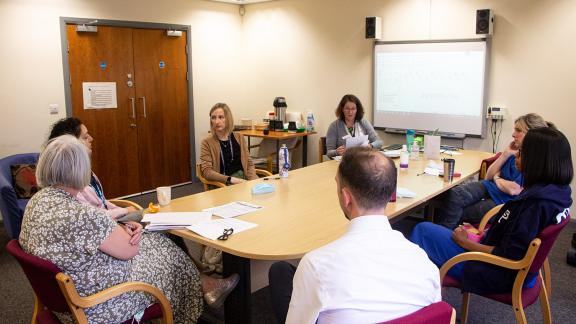Implementing a just and learning culture

This case study provides information about what the training covers and how it can be practically implemented even during the pandemic. The trust estimates that the just and learning culture has provided economic benefits of roughly £2.5million since 2016.
Overview
In 2016, Mersey Care NHS Foundation Trust began to implement a ‘just and learning culture’ within their organisation. The culture fundamentally changed the way it responded to incidents, patient harm, and complaints against staff. After seeing the benefits in their own organisation, the trust partnered with Northumbria University to create a just and restorative learning training package for other organisations to follow.
Key benefits and outcomes
Mersey Care NHS Foundation Trust estimates the economic benefit of a just and learning culture in their organisation to be roughly £2.5 million. This is made up of:
- A reduction in suspensions by 95 per cent and disciplinary investigations by 85 per cent since 2014. At the same time the trust has increased its workforce by 135 per cent.
- An increase in reporting of adverse events.
- An increase in staff who felt encouraged to seek support.
- An increase in staff who felt able to raise concerns about safety and unacceptable behaviour.
What the organisation faced
Mersey Care’s reliance on HR processes and practises which focused on rules, violations, and consequences were not seen to be working for its employee relations disciplinaries.
Costs associated with suspensions were rising. So too were legal costs, agency costs for backfill absenteeism, and staff turnover.
The organisation decided on a new approach. Steps to implement a just and learning culture were taken. This type of culture involves creating an environment where staff feel supported and empowered to learn when things do not go as expected, rather than feeling blamed.
What the organisation did
So far, the trust has trained over 400 individuals at Mersey Care in the just and learning culture way. The trust intends to provide further training across the organisation during the autumn. There has also been appetite from other trusts to learn from Mersey Care and in collaboration with Northumbria University, it has developed an accredited programme to enable other organisations to take part in the training too.
Typically, training is provided face-to-face. This year, due to the COVID-19 pandemic, the trust plans to deliver the training via a blended digital learning approach. Mersey Care worked closely with Northumbria University to develop engaging training in a virtual setting to help learners to get the most out of the new way of training.
The programme is aimed at managers, patient safety leads, operations managers, staff side colleagues, OD and HR. It is requested that a board member commits to supporting those who attend the training and provides an opening comment or letter to attendees to endorse their attendance and permission to enact their learning.
The programme includes four days of facilitated teaching over three weeks. It is delivered through a variety of live speaker and group facilitated sessions, self-directed learning through workbooks and filmed role plays and presenter sessions. This blended digital learning approach aims to retain an authenticity that could have been lost via an e-learning package.
Considerations have also been given as to how to ensure that those who attend the training feel psychologically safe. This is more challenging in an online setting, so adaptions such as shorter days and less days per week of virtual training have been factored in. Training online is tiring and having no more than eight learners and a tutor is considered best practice to ensure meaningful engagement.
The course material can be completed individually or in small groups. Reflective learning is built into the programme. Upon completion of the third week, participants take three actions back to their organisations to work on. Six weeks after that, participants complete a post-programme action learning set. This is a new step to enable the trust to evaluate and understand what is working well with the programme, and what might need to be adapted to work better for learners.
The aim of the programme work is to allow participants to implement what they have learnt into their own organisations and accelerate the transition from Mersey Care’s experience.
Mersey Care’s staff survey shows safety, morale and performance have all improved.
Results and benefits
Research the trust commissioned shows staff feel more engaged, open and able to speak up. There have been increases in staff morale and job satisfaction, staff engagement among senior leaders has increased and so has staff motivation. The research found there is an increased feeling from staff that they work in an ‘open and accommodating work environment that facilitates honesty and learning’. This is directly linked to the just and learning culture and training the trust provides.
The trust continues to assess the economic benefit of a just and learning culture (estimated to be roughly one per cent of turnover) and look at the impact it has on women, black, Asian and minority ethic (BAME) staff and other underrepresented groups.
Mersey Care NHS Foundation Trust’s vacancy rate currently stands at 3.5 per cent. They have a waiting list for district nurses in some areas and other professions. The organisation’s just and learning culture is seen to be a large part of that pull.
Overcoming obstacles
Great strides have been taken at Mersey Care, but the trust admits it do not always get it right. When things do not go to plan, they take ownership and apologise for it, and they learn from it.
The goal of the culture is ultimately to restore faith, but this is not always possible. This can lead to difficult conversations.
Takeaway tips
- When training online, use smaller groups of up to eight or nine people (including the presenter), this way everyone’s face can be seen on the software and it makes the session more interactive.
- Get board support to show the organisation’s commitment to the training.
- It is easier to create a psychologically safe environment when everyone is in the same room, it is harder to do online, but just as important to the success of the training.
- Giving people the chance to analyse a situation with hindsight and by asking the question ‘what happened and how can we understand it?’ can be powerful as they understand all of the factors and context behind a decision.
Further information
Watch Mersey Care’s Just Culture journey, as told by the staff themselves.
Further details on Mersey Care’s Just and Learning culture can be found on its website, and you can register your interest in attending Northumbria University's Principles and Practices of Restorative Just Culture course.
For more information about the work in this case study, contact Amanda Oates, Executive Director of Workforce, Mersey Care NHS Foundation Trust:
amanda.oates@merseycare.nhs.uk or Kristina Brown, Northumbria University: kristina.brown@northumbria.ac.uk



